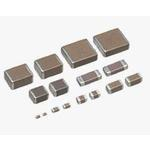Global vs. Local: Finding the Right Ceramic Capacitor Supplier for Your Needs
1. Overview of ceramic capacitors
Introduction to Ceramic Capacitors:Ceramic capacitors are indispensable components in modern electronics, known for their versatility, reliability, and effectiveness in various applications. They function by storing and releasing electrical energy in circuits, playing a critical role in filtering, buffering, and stabilizing voltage. Due to their small size, low cost, and excellent performance characteristics, ceramic capacitors are widely used in everything from smartphones and laptops to industrial machinery and medical devices.
Types of Ceramic Capacitors:Ceramic capacitors come in several types, each designed for specific functions and applications. The most common include: Multilayer Ceramic Capacitors (MLCCs): Known for their high capacitance and small size, MLCCs are used extensively in consumer electronics.High-Voltage Ceramic Capacitors: These are designed to handle higher voltage applications, making them ideal for use in power supplies and industrial equipment.Low-ESR Capacitors: These capacitors offer low equivalent series resistance, making them suitable for high-frequency applications where power loss needs to be minimized.
Multilayer Ceramic Capacitors (MLCCs): Known for their high capacitance and small size, MLCCs are used extensively in consumer electronics.High-Voltage Ceramic Capacitors: These are designed to handle higher voltage applications, making them ideal for use in power supplies and industrial equipment.Low-ESR Capacitors: These capacitors offer low equivalent series resistance, making them suitable for high-frequency applications where power loss needs to be minimized.
Selecting the right type of ceramic capacitor is crucial for ensuring optimal circuit performance and longevity.
2. Key Factors in Selecting ceramic capacitor suppliers
Quality and Certifications:When choosing a ceramic capacitor supplier, one of the foremost considerations is product quality. High-quality capacitors are essential for the reliable operation of electronic devices, especially in critical applications like automotive and medical equipment. Look for suppliers who offer products that meet international quality standards such as ISO 9001, RoHS compliance, and other relevant certifications. These certifications ensure that the capacitors you purchase are manufactured to stringent quality standards and are free from hazardous substances.
Product Range and Customization:A reliable supplier should offer a wide range of ceramic capacitors to meet diverse needs. Whether you require standard capacitors or specialized components with unique specifications, the supplier should be able to provide them. Additionally, some suppliers offer customization services, allowing you to tailor capacitors to specific voltage ratings, capacitance values, and temperature ranges, which is particularly beneficial for specialized applications.
Reputation and Customer Service:
The reputation of a supplier is often a good indicator of the quality of their products and services. Established suppliers with a solid track record in the industry are more likely to provide reliable components. Customer service is equally important; a supplier who offers technical support, easy returns, and responsive communication can significantly streamline your procurement process and help you resolve any issues that arise during product selection or after-sales service.
3. Global vs. Local Ceramic Capacitor Suppliers
Global Suppliers:Global suppliers often have a broad inventory and the latest technological advancements in ceramic capacitors. They can offer competitive pricing due to economies of scale and may have the capacity to supply large volumes of capacitors. However, sourcing from global suppliers can come with challenges such as longer lead times, higher shipping costs, and potential delays due to international logistics issues. Moreover, communication barriers and time zone differences can complicate interactions, particularly when urgent support is needed.
Local Suppliers:Local suppliers, on the other hand, offer quicker turnaround times and more personalized service. They are often more responsive and can provide face-to-face consultations, which is valuable for complex projects that require detailed technical discussions. Additionally, local suppliers can reduce the risk of supply chain disruptions and offer more flexible delivery options. However, they may have a more limited range of products compared to global suppliers, and prices might be higher due to smaller economies of scale.
Balancing Global and Local Sourcing:
Many businesses find that a hybrid approach works best, leveraging the extensive range and competitive pricing of global suppliers while relying on local suppliers for quick delivery and personalized service. This strategy allows for greater flexibility and ensures a steady supply of components, even in times of global supply chain disruptions.
4. The Role of Electrical Capacitor Suppliers in the Supply Chain
Inventory Management:Electrical capacitor suppliers play a critical role in managing the supply chain, ensuring that manufacturers have access to the capacitors they need, when they need them. This involves not only stocking a wide range of products but also forecasting demand to prevent shortages or overstock situations. Effective inventory management by suppliers can significantly reduce lead times and help manufacturers avoid production delays.
Quality Assurance:Top-tier suppliers implement rigorous quality control processes to ensure that every capacitor meets industry standards. This often involves extensive testing for capacitance, voltage ratings, and temperature tolerance, among other specifications. Suppliers who prioritize quality assurance help their customers avoid costly recalls and product failures.
Support Across Industries:
Capacitor suppliers serve a broad range of industries, including automotive, telecommunications, and consumer electronics. Each of these sectors has unique requirements, and suppliers must be able to cater to these diverse needs with specialized products and technical expertise. For example, the automotive industry may require capacitors with high vibration resistance, while the telecommunications sector might prioritize capacitors with low signal distortion.
5. Trends and Innovations in Ceramic Capacitors
Advancements in Technology:The ceramic capacitor industry is continuously evolving, with innovations aimed at meeting the growing demands of modern electronics. Recent trends include the development of capacitors with higher capacitance values in smaller packages, improved temperature stability, and enhanced durability. These advancements are particularly important as devices become more compact and powerful, requiring components that can perform reliably under increasingly challenging conditions.
Impact of Miniaturization:As electronic devices continue to shrink in size, the need for miniaturized components has become more pressing. Suppliers are responding by offering ceramic capacitors that are smaller yet still maintain high performance. This miniaturization trend is critical in sectors such as consumer electronics, where space is at a premium, and in medical devices, where compact components are essential for minimally invasive technologies.
Sustainability and New Materials:
Sustainability is becoming a key focus in the development of ceramic capacitors. Manufacturers are exploring the use of environmentally friendly materials and processes to reduce the ecological impact of capacitor production. Additionally, the adoption of new materials like barium titanate and lead-free ceramics is helping to improve the performance and safety of capacitors, aligning with stricter environmental regulations.
6. Future Outlook for Ceramic Capacitor Suppliers
Growing Demand:The demand for ceramic capacitors is expected to continue growing, driven by the expansion of industries such as electric vehicles, renewable energy, and 5G telecommunications. Suppliers who can anticipate these trends and adapt their offerings accordingly will be well-positioned to capitalize on these opportunities.
Innovation and Sustainability:Looking ahead, innovation in capacitor technology will likely focus on improving performance while reducing environmental impact. Suppliers who invest in research and development, as well as sustainable practices, will be key players in the future market.
Preparing for Technological Shifts:
As technology evolves, so too will the requirements for ceramic capacitors. Suppliers must stay ahead of these changes by continuously updating their product lines and developing new solutions to meet emerging needs in sectors like IoT, autonomous vehicles, and advanced robotics.
7. Recommended Brands and Suppliers
Top Brands:When selecting ceramic capacitors, it's essential to choose products from reputable brands known for their quality and reliability. Renesas Electronics, TDK, and KEMET are some of the leading brands in the industry, recognized for their innovative designs and consistent performance.
Suppliers:For sourcing these high-quality components, unikeyic Electronics is a trusted supplier. They offer a comprehensive range of ceramic capacitors and provide expert technical support to help you find the right products for your specific applications. Unikeyic Electronics stands out for its commitment to quality, reliability, and customer service, making them an ideal partner in your electronic component supply chain.





















